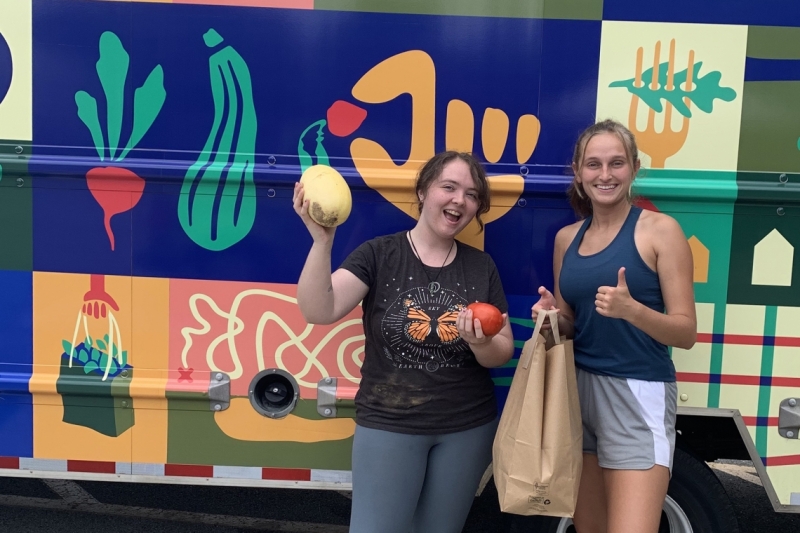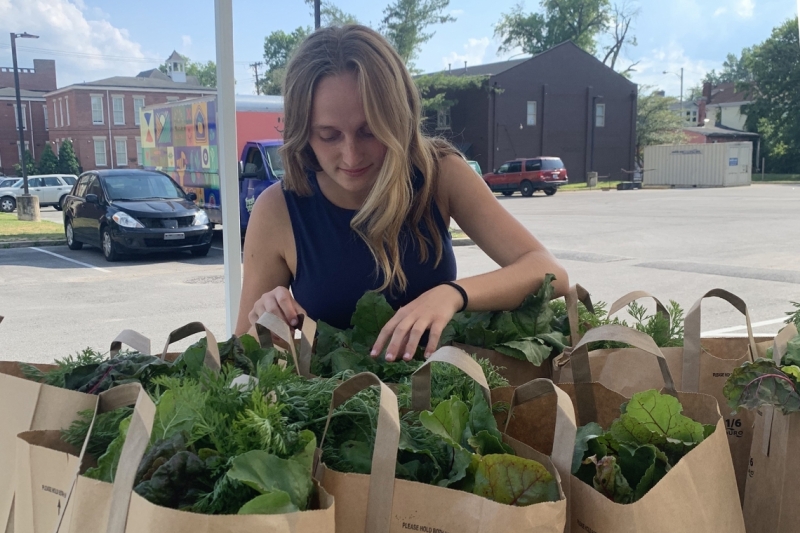Rooted in Justice Kiera Stankewich ’25 tackled food justice in Louisville, Kentucky this summer through the Shepherd Higher Education Consortium on Poverty.
“I want to be able to apply my interest in science and the environment to promote public health, healthy equity, and minimize the risk and impacts of disease.”
~Kiera Stankewich ’25
Name: Kiera Stankewich ’25
Hometown: Guilford, Connecticut
Majors: Neuroscience and Environmental Studies
Minor: Poverty and Human Capabilities Studies
Q: What factors led you to choose W&L?
I was seeking out a small liberal arts university and Washington and Lee was ultimately the best fit for me. Lexington is beautiful and I loved the small-town feel with the cute downtown and opportunities for engagement with local community members. I was so excited to explore House Mountain, the Devil’s Marbleyard and the Chessie Trail, and watch sunsets over the Blue Ridge parkway. I am a member of the Bonner Program and the Shepherd experience was a huge draw to W&L. I play the clarinet in the University Wind Ensemble, will be a Peer Counselor this fall, and currently serve on the leadership teams for Campus Kitchen, Amnesty International, WLUnite and SEAL.
Q: Why did you choose your course of study?
I am currently planning on studying neuroscience, environmental studies, and poverty and human capability studies on the pre-med track. When attending a virtual open house with Washington and Lee, I joined a pre-health breakout room where the professor made clear the invaluable experience of doing the Shepherd Program in combination with a pre-med track. She described how the possibility of pursuing a poverty and human capability studies minor pairs well with my interest in pursuing an allied health career where I can learn about and help people that need advocacy and support. I also hope to learn about the intersectionality between health and environmental issues. By majoring in environmental studies to learn about sustainability and promote food and environmental justice for all people, I hope to reduce the disproportionately detrimental impacts of environmental issues on low-income communities, people of color and those with disabilities.
Q: How did you find out about your summer opportunity? Did anyone at W&L help?
Along with my poverty and human capability studies minor, I am part of the Bonner Program; both prioritize respectful service and community engagement. By participating in a program like Bonner, I get to work alongside students and community members who share my passion for social justice and want to make positive change within their community. In attending Washington and Lee, I was hopeful that through this civic engagement, I could better understand the underpinnings of poverty and address it with more sustainable solutions. The SHECP internship offered the perfect opportunity to do so in Louisville, Kentucky. Talking with students and alumni who had completed fulfilling internships in past years, along with conversations with professors from the Shepherd Program, made it an easy choice to pursue this summer internship. I was excited to gain some new perspectives and insights into working to address both the causes and consequences of poverty and inequality, respectfully.
Q: What kind of work are you doing?
This summer, I spent eight weeks in Louisville, Kentucky working with New Roots: Fresh Stop Market, a nonprofit that focuses on food justice. This small organization reaches about 700 families, which equates to 2,200 community members. Their mission is to increase fresh food access and ensure that affordable fresh food is available year-round in all neighborhoods. The markets function similarly to a crop share. My responsibilities included office work in the morning and tending markets in the afternoon. In the office, I completed paperwork, edited spreadsheets, sent reminders for people to pick up their shares, published blog posts, handled phone calls and organized deliveries to bring shares of produce to those unable to access the markets themselves. In the afternoons, we went to the markets to organize, pack and distribute fresh produce to community members. The produce came from local organic farms, and there was a total of nine locations, where each market operated every other week. Families and individuals signed up and paid for this crop share on a sliding-scale system based on their income. Each bag has eight to 10 food items, which change weekly.
Q: What do you like most about it, and what has been most challenging so far?
I like how New Roots prioritizes treating the shareholders justly, which upholds the Shepherd mission of respectfully treating the dignity of each person by fostering a community-based model. New Roots focuses primarily on food injustices that are both causative and responsive to the scourge of poverty and inequality. As a grassroots organization, they believe in enlisting the help of the people who they are serving and recognize that these community members – in partnership with the staff and volunteers – ultimately create targeted intervention, which is critical to the success of reducing food insecurity. I was exposed to a lot of new information, especially about food justice within Kentucky. Although New Roots had a tangible impact on the community, with immediate gratification often attached, I learned more about the difficulties in accessibility and sustainability within nonprofit work. Community work has setbacks and challenges, all of which require patience, problem-solving and adaptability. Progress sometimes is slow, frustrating and tiring, but by leaning into the people you engage, maintaining self-care, and being hopeful for a future of justice and respect, we can create a foundation of trust between all stakeholders in this mission. Hopefully with this established trust, we can reach the broader community and attain the sustainability, accessibility and personalized experience for each shareholder.
Q: What aspect of the work has surprised you the most so far?
I was pleasantly surprised by the power of this community-based program and how well-received it was by community members. I witnessed boundless generosity by shareholders willing to drive extra to make a delivery for somebody who was sick or disabled or without access to a car and met volunteers who came to our markets. I appreciated that I had the opportunity to use my Spanish to communicate with shareholders who didn’t speak English. Although I have previously witnessed the power in sharing food, it continued to surprise me each time how much joy a simple distribution of fresh produce carried, as well as how much commitment community members were willing to invest in this program to make it accessible and sustainable in response to their gratitude and appreciation of New Roots.
Q: How do you think your current summer experience – and others you’ve had in the past, if applicable – will impact your future career path?
My internship at New Roots connected well with my interest to pursue a career in the medical field because the wellbeing of the environment – especially access to fresh food and air quality – directly impacts people’s health. In working within the focus of food justice, I met many shareholders who joined this program with the intention of addressing underlying health problems, many of which disproportionately affect people experiencing poverty and inequality. I want to be able to apply my interest in science and the environment to promote public health, healthy equity, and minimize the risk and impacts of disease. The defense of human rights is prevalent through all areas of study and work, and the health field in particular needs this advocacy. The issue of ethics is important to me in my education, and as such, I hope to apply it to my involvement beyond the classroom.
Q: Outside of your internship, what have you enjoyed the most about where you’re living and working this summer?
Coming from a small, sleepy town, living in a city means there is always something to do and events going on. I took advantage of free nights and weekends to get out of my apartment, hop on a bus with other members of my SHECP cohort and explore! My favorite thing we did together was attend one of the shareholder’s performances of Latin music and do a cumbia dance lesson beforehand. I got to apply the dance moves I had learned from my spring term trip to Costa Rica for a Spanish class, so it was a wonderful experience to immerse myself in the different cultures of Louisville and have some fun!
Q: What do you miss about W&L while you’ve been away?
Of course, I miss all my friends. Being in the city has especially made me miss the mountains and hiking, as well as sitting on the Colonnade or playing spikeball. I especially miss watching sunsets at the parkway or Glenn Maury Park. I am also excited to go to Sweet Things and on Cook Out milkshake runs with my friends when I get back to campus.
If you know any W&L students who would be great profile subjects, tell us about them! Nominate them for a web profile.
 Kiera Stankewich ’25 tackles food justice during her summer internship in Kentucky.
Kiera Stankewich ’25 tackles food justice during her summer internship in Kentucky. Stankewich packs fresh produce for pickup.
Stankewich packs fresh produce for pickup.
You must be logged in to post a comment.